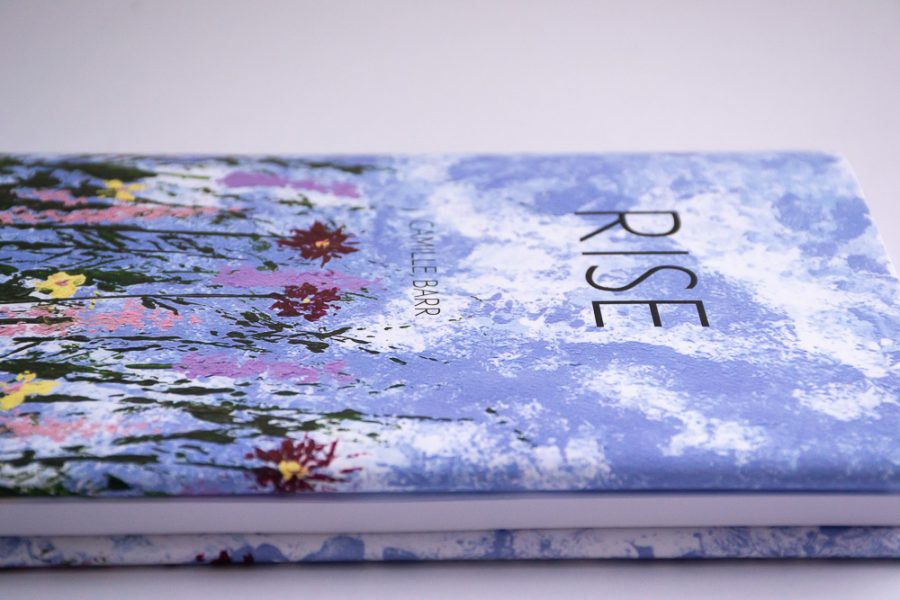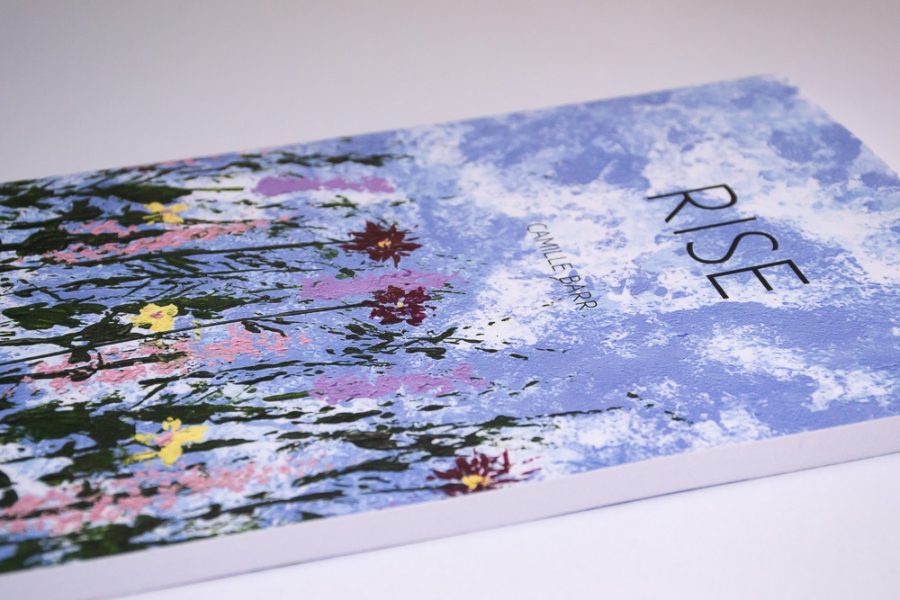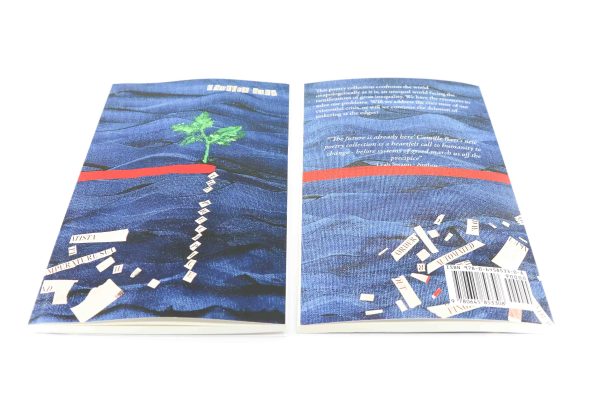Description
This collection of poetry began as an exploration into the conceptual idea of happiness; in a way it is the second chapter to Behind the Facade, my first collection of poetry, where I attempted to look beneath the exterior structures that form society.
My examination into the concept of happiness must take into account both politics and the economy to give it context in the modern world. In order to gain a better understanding of these domains I read widely: academic work, articles and novels.
Firstly addressing politics, as the common saying goes, ‘all life is political’: the life we can or cannot live is determined by government policy. My research revealed a very profound example in access to birth control and whether women can choose if and when they want to have children. They do not decide this alone, government policy also has a voice in the decision-making process as it decides what choices they have available to them. Life and the direction it will take is, from the very start, a political decision before all else. A woman only has autonomy over her own body if the government writes it into law. Interestingly there is no male comparison of this sort of government-controlled autonomy (which seems a contradiction of terms) over one’s body.
The economy is intertwined with politics because the rules of trade are set out by government policy. This further enables or limits the choices we can make for ourselves. From this perspective the government and the economy are not mutually exclusive.
I believe that how the conceptual idea of happiness relates to politics and the economy lies within its relationship to freedom. My hypothesis is that freedom is intrinsically linked to happiness because we are instinctively inclined to aspire to a place of self-determination. Self-determination provides the platform for curious minds to foster the evolutionary process, which allows for the continuation of the species as life is always in motion and we must have the opportunity to adapt to the ever-changing world around us.
However I do not intend for this to be confused for a pursuit of utopian ideals, as that too would be obstructive to freedom. We must be able to make mistakes because they provide important learning opportunities.
We live in a capitalist society, this is not disputed, however how it functions for the people is widely disagreed. Importantly, as I researched politics and the economy, what became clear is that although there is debate around how a capitalist system works, such a debate is not based solely on empirical evidence. This trend means perceptions matter more than reality and decisions are made based on ideologies not evidence.
So while I was researching I was also using poetry as a way to dissect ideas and hold up the language used in politics for closer examination; to uncover what was really being said and why. It appears we are in the midst of “the battlefield in the war of ideas … over framing; and in that battle, words are pivotal” (Joseph Stiglitz, The price of inequality, p.204).
As a poet words are ‘pivotal’ to me also. Word choice is as important to me as colour choice is to an artist. Because of this I refer regularly to the dictionary throughout my writing process. Understanding a word by its dictionary definition empowers us to be able to identify when language is being used to misrepresent an idea. That is why I have included examples of the dictionary definitions for capitalism and imperialism. I encourage everyone to critically evaluate them.
Capitalism – An economic and political system in which a country’s trade and industry are controlled by private owners for profit, rather than the state.
-New Oxford American Dictionary
The framing of words to foster support for an economic system that is failing both the majority of people and the entire environment on a monumental scale is no more evident then in the tag line “the market will provide”.
The pro-capitalist neoliberal will argue that the market provides ‘free choice’ (James Buchannan economic ideology) and that we have a free market. This so-called freedom is meant to provide the people with what they need to take care of themselves. But does it?
When this argument is examined, the capitalist market is full of strikingly inhumane failures to provide for the whole society. This is particularly true in its failure to provide equal employment opportunities. The fact that capitalism cannot provide the most basic of necessities for all is hidden behind misleading language such as ‘natural unemployment rate’. The word ‘natural’ makes us feel that it is normal to allow some to go without the basics for sustaining life and, even worse, that there is nothing we can do about it.
There is nothing natural about forcing people to starve in a world of plenty. But this is exactly what capitalism does, the ramifications of which are that a decent society can never be achieved in a system that builds utter deprivation for some into its model.
The full employment conundrum under capitalism occurs as labour forces are forced to seek employment as individuals and the self-interest of the individual out of context of the greater whole means that workers are made to compete against each other for limited jobs.
The principle is simple really when we think only as individuals. Our self-interest directs us to work against each other which is counter productive to creating a decent society. However when we see ourselves as individuals that are part of a greater whole, then our self-interest tunes into recognising that collectively we achieve more not only for the group but also for ourselves. That is not to say that we must all work in collectives and lose our individuality, but rather think collectively. An example would be a group of sole traders that support each other by trading amongst each other; their collective power enables the individual to thrive without sacrificing individual freedom.
The core purpose of any economic structure must be that it can support the basic necessities of life for all, not 1%, not 50%, not even 99%. To be considered successful it must reach 100%. Otherwise all we have is an underdeveloped, uncivilised system that requires sacrificial lambs, so to speak, in the form of unemployed citizens.
This makes the task of finding employment even harder, resulting in long-term unemployment where people become so poor they lose the means to have a voice. The unemployed become an easy target to vilify. All the blame is then shifted to the individual and not the system that sacrificed them.
The argument turns from being about the fundamental flaws of the system to one of individual flaws. The use of statements such as ‘you just have to work harder’ implies that the system not providing for someone is the individual’s fault, not a fault in the system. This type of shaming is an example of perception verses reality that uses “framing” to shape the debate and steer it off topic.
The problem with arguing that hard work equals reward is that it does not acknowledge that to participate within the so-called free capitalist market one must first have access to capital (money) beyond what they need for survival, they need a surplus or access to one through a loan. Adam Smith the moral philosopher (often quoted by pro-capitalists even though he was pre-capitalism), and author of The wealth of nations, observed, “Money, says the proverb, makes money. When you have got a little, it is often easy to get more. The great difficulty is to get that little” (p.70).
By understanding how capital is created we are exposed to the reality that a capitalist market is not one of free choice and free trade but rather one that is only open to and driven by the owners of capital. This negates the free choice theory on many levels. One in particular is that it leads to a concentration of wealth as money creates money. This is achieved as capitalism commodifies (puts a monetary value on) everything, even time is money. A system of free trade cannot exist while only money, not people, can freely move across borders. A person or even a whole community that only has its labour to sell loses bargaining power when their movements are restricted by borders. Big money knows no borders and can move in and monopolise the labour market to such an extent that they have no other choice but to work for them.
Capitalists would counter this argument by suggesting people work harder to create the surplus, however this too is where the market again fails them. Again deferring to Adam Smith who observed,
“The wear and tear of the slave, it has been said, is at the expense of his master; but that of a free servant is at his own expense. The wear and tear of the latter, however, is, in reality, as much at the expense of his master as that of the former … to continue the race … But though the wear and tear of a free servant be equally at the expense of his master, it generally costs him much less than that of a slave. The fund destined for replacing or repairing, if I may say so, the wear and tear of the slave, is commonly managed by a negligent master or careless overseer” (p.61-62).
Not much has really changed in this situation as we face wage stagnation alongside the rising cost of living. Another example of the mismanagement of the funds necessary for maintenance is the corporation or business that avoids paying a living wage and their fair share of tax. They have convinced us that their duty was fulfilled to society by providing a job for a wage earner.
This is another example of how the powerful, as Joseph Stiglitz puts it, frame the discussion so that it appears that our interests align with theirs. The reason for this is, I am reminded, by Noam Chomsky who has been known to comment, too much freedom has been won to take power by force anymore. So the attack on freedom (democracy) for the benefit of property owners has become one of a more subversive nature.
Further with the tax debate venturing into the realm of public education arguments are formed around taking personal responsibility. This is known as the ‘user pays’ argument given by the economist James Buchannan and is used to justify lower business taxes whilst simultaneously blocking the opportunity of higher education for the majority. However as Adam Smith concluded, they should pay as: to continue the race and further more in this case to provide an educated worker capable of doing the job, which earns them the profit. For without fair wages and a fair tax system, business stands to lose as much as the individual does.
The pro-capitalist may suggest getting a second job to create a surplus but put aside the fact that this is not a long-term sustainable option in terms of wellbeing; a second job can actually put a downward pressure on wages. Meaning the harder you work the less you get per hour. Owing to the fact that overworking diminishes our mental and physical health (we are not robots), having a second job can mean we don’t get the rest that is imperative to our overall health. This is indeed a poverty trap. Possibly creating a situation where “It is better, says the proverb, to play for nothing, than to work for nothing” (Adam Smith, The wealth of nations, p. 243). The profit motive can actually take away from the work motive if it is left to fester into such unsustainable levels of inequality.
Allow me to better explain how a downward pressure on wages is created when those at the bottom start getting second jobs. This is to dispel the ‘just work harder’ falsehood that is propagated. Say, for example, a business owner hires an employee with the expectation and hope that through their production an increase of profit will arise. Their wages are calculated as a percentage of the cost of running a business not as a percentage of the profit made from their labour. An element of ‘faith’ is required within the decision making process when it comes to hiring employees as the business owner must have faith that the economy is doing well enough to drive the demand for their product that justifies the expense of hiring staff.
When workers start looking for second jobs they also start the process of wage competition or what is also known as a race to the bottom. They become willing to offer their labour for less as a means to secure the second job so they can gain an advantage over other perspective employees. This race to the bottom also weakens the faith aspect of the economy as a business owner will start to worry about why so many people need a second job, could it be that many are not fairing well under the current economic conditions? Leading to less faith that there will be the demand for their product and thus reluctance to hire more employees. It is a fear that becomes self-fulfilling as less jobs offered and lower wages mean that people have less capital (money) to recycle within the economy and there really is less demand for their product. This is why the ‘work harder’ slogan is actually a very cruel and unhelpful attitude to take towards those that are stuck on low wages without access to enough capital to break out. This is a summation of an example the economist Yanis Varoufakis gives in his book Talking to my daughter about the economy.
This trap of having a second job illustrates the inability of the capitalist economy to withstand the pressure of competition in a profit-driven market. It always turns into a race to the bottom (a place where there are no winners). The anti-competition fault within the system is also terrible for innovation which in turn is terrible for business, ‘they shoot themselves in the foot’ so to speak. The economist Joseph Stiglitz touches on the anti-competition tactics within the market in his book The price of inequality, if you are looking for more information on this subject.
The seeds of capitalism, it would appear, are bearing the bitter fruit of inequality, and misery for the majority. Under the continual growth profit motive of capitalism we edge towards creating complete class division with an oligarchy (ruling class) living in compounds and workers (slaves) living in ghettos. The spread of this unhappiness is no more profound than in the so-called land of opportunity, America, that is experiencing the “hollowing out of the middle class” (Joseph Stiglitz, p.31). This seems to be the inevitable outcome of a system that gives an ever-increasing slice of the pie to those at the top of the hierarchy.
“America has more inequality than any other advanced industrialized country, it does less to correct these inequalities and inequality is growing more than in many other countries” (Joseph Stiglitz, The price of inequality, p.31).
Inequality is the consequence of the capitalist model that operates from the top down, it is in no way democratic. The workers have little to no say over how the business operates; it is up to the owner or CEO. It is a system that produces one class of rulers and another class that is ruled. “Under capitalism, we can’t have democracy by definition. Capitalism is a system in which the central institutions of society are in principle under autocratic control” (Noam Chomsky, Language and Politics, p.138, 2004, AK Press).
Looking at capitalism through this lens reminded me of the analogy I heard Chomsky make about capitalism and imperialism creating essentially the same form of governance. Basically, it erodes democratic structures by its “capture of politicians” that is used in “influencing public opinion” referred to as “corruption American style” (Joseph Stiglitz p.202-204) with the donations to political parties being made with strings attached to the capitalist class. This “capture” of the political arena enables those at the top of the capitalist structure to direct policy that further cements their power over the majority.
Imperialism – a policy of extending a country’s power and influence through diplomacy or military force: rule by emperor.
-New oxford American Dictionary
It is the top down management style of capitalism that makes it unmistakably similar to the system of imperialism. Imperialism is a form of governance that most accept as being unfair and undesirable for the brutal and unjust outcomes it produces. It is not an environment that can foster freedom for the majority and becomes a very unpleasant place to live with a ruling class system that creates widespread poverty. When we look at poverty we must acknowledge its roots in slavery, within this context we can see poverty for what it is and only differentiated from slavery in that the poor are now free to starve.
Poverty not only causes a loss of opportunity for the individual, it deprives society of potential. We are all poorer for the poverty that we allow to exist. This brings into question the idea of the self-proclaimed merit of those at the top. It would seem while the slavery type situation of poverty exists then no one at the top can claim their position on the basis of merit when those at the bottom do not even get a shot. It is a one-man race, in that you take out the competition from the beginning and you guarantee your place as the winner.
In the essay A room of one’s own by Virginia Woolf we are gifted with the remarkable examination of the opportunities afforded to women by being asked if Shakespeare had had a sister of equal talent could she have risen to his success? Woolf recounts all the steps to Shakespeare’s success and even though yes of course they include his talent and hard work, what it illuminates is the opportunity open to him to showcase his talent and hard work that was closed to women at the time. Woolf illustrates why merit as a concept cannot really be taken seriously while access to opportunity is blocked for so many.
Any system that uses this type of merit-based bias to justify power could never really be considered legitimate, as merit could not be ascertained with such a restricted pool of applicants. Adding to this, the ruling class of so-called elites could never produce what could be considered a truly civilised society due to their exclusionary nature. This is a terrible outcome for everyone, even the ruling class will suffer eventually under a less democratic system. The unsustainable system inevitably crumbles as history has shown us many times. Take the lack of action on climate change as an example where concentrated power and wealth is obstructing necessary change that threatens their very own existence, this time though they could take the entire planet down with them.
We do have a tendency to be put off by politics; this is no accident because it leads to less awareness, less participation and the seeking of leaders that enables the concentration of power to form. However, I challenge you to first consider this: if we seek a leader we put ourselves in the position of follower and thereby relegate ourselves to the back seat of our lives. Would it not be better to encourage a representative government with the people as active participants rather than passive onlookers?
The title of this book, Rise, is a reference to this type of participatory democracy. With the recognition that democracy provides a dignified life for all through the ability for all voices to be heard from the position of one person, one vote platform it provides. As I asserted earlier, the government and the economy are not mutually exclusive, in fact they are two parts of the same organism that produces the policies that direct our lives. The problem we are currently experiencing with this however is that while our government may claim to be democratic, capitalism is “autocratic” (Noam Chomsky) which means our democracy becomes merely “aspirational” as Timothy Snyder refers to it in his book On Tyranny. We have a situation of “democracy in chains” (Nancy MacLean) by the undemocratic forces of capitalism. The two cannot live harmoniously within the same structure, as they are by definition at odds with each other.
Democracy is losing the freedom to operate under capitalism and the individual is restricted to being a “wage slave” (Noam Chomsky), making the distance to freedom even greater. My poetry focuses on such things as capitalism because it is an impediment to opportunity, which is the cause of so much unhappiness due to the loss of freedom.
To know happiness we must first know unhappiness, we must understand the cause to find the remedy. Even if the process of finding happiness means I make a mistake, at least let it be of my own making, from this I have a place to grow. For those at the top it is hard to imagine that they have made a place where happiness resides. When they live in constant fear of losing what they have and spend all their energy in the pursuit of protection instead of the pursuit of happiness, and so defeating the whole purpose. Vast amounts of wealth can be a prison of its own making, it would seem.
Freedom alone may not ensure happiness, but it certainly provides the right environment for it to be cultivated, as opposed to a capitalist system that provides the same oppressive class system as imperialism. Once we recognise this then we know the market will not provide.
I have attempted through this collection of poetry to combine science and art by relying on empirical data to help inform my ideas that are then expressed in the more abstract form of poetry. This is because I view science and art as complimentary associations. The mirror one holds to either is the check and balance for the other. Art sets the imagination free, while science has the ability to make dreams come true.
















